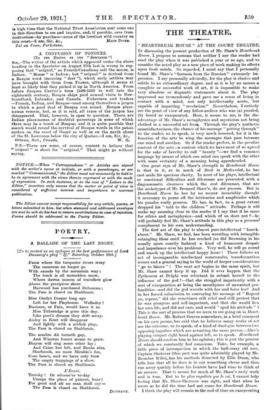A CONFUSION OF TONGUES.
LTO THE EDITOR Or THE "SPECTATOH."3
Sut,--The writer of the article which appeared under the above heading in the Spectator on August 27th last is wrong in sup- posing that " orignal," as French-Canadians call the moose, is Indian. " Moose " is Indian ; but orignal " is derived from a Basque word (meaning " deer "), which early settlers may have brought with them from France„ although it seems at least as likely that they picked it .up in North America. From .before Jacques ,Cartier's time (.1496-1552) to well into the eighteenth century, Basque ships paid annual visits to New- foundland, Labrador, and Canada. Fishermen and traders —French, Indian, and Basque—used among themselves a jargon in which a good deal of Basque was mixed. Basque place- names remain, but, so it is said, all trace of the jargon has disappeared. That, however, is open to question. There are Indian place-names of doubtful -parentage in some of which there may be a touch of. Basque; and it is quite possible that search would reveal the survival of Basque words in the patois spoken on the coast of Gaspd as well as on the north shore of the St. Lawrence below the city of Quebec.—I am, Sir, &c.,
P.S.—There are some, of course, content to believe that orignal " is short for " original." That might go without saying.






































 Previous page
Previous page